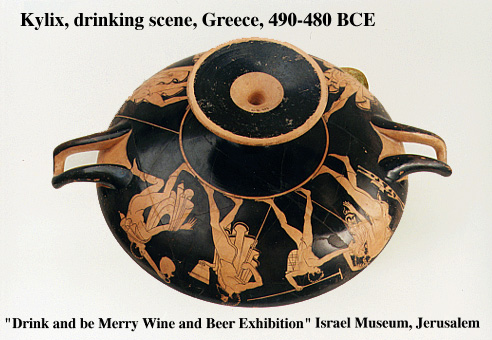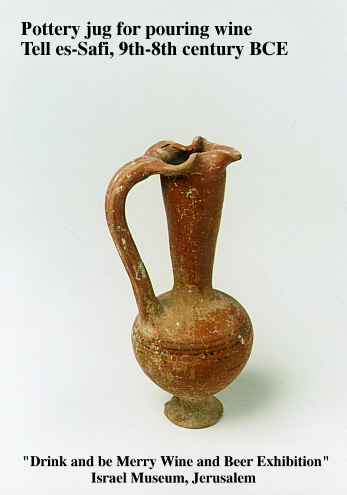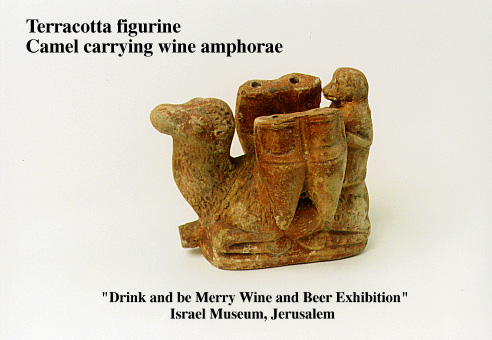 |
Spirited exhibition explores 5,000 years of wine and beer production and consumption, and features rare loan items from the world's great museums.
Drink and Be Merry: Wine and Beer in Ancient Times Opening: June 2, 1999, 6pm
 |
JERUSALEM, June 1, 1999: The jugs in which King Herod of Judea imported his wine from Italy. An Egyptian brewery model from the second millennium BCE. These items are among the spectacular artifacts inaugurating the Israel Museum's millennial celebrations this summer. Spanning a period of 5,000 years, "Drink and Be Merry: Wine and Beer in Ancient Times" traces the history of wine and beer in the land of Israel and the region, from production, trade and marketing to the role of alcohol in ritual, medicine and culture. Featuring rare loans from museums internationally, the exhibition also invites visitors to recreate the ancient experience of wine and beer. The exhibition opens to the public June 3 through January 1, 2000 and includes a full schedule of related events, featuring a summer-long wine, beer and music festival.
 |
Covering the period from the fourth millennium BCE to the Byzantine period in the fifth and sixth centuries CE, "Drink and Be Merry: Wine and Beer in Ancient Times" concentrates on history and archaeology in ancient Israel, while also including a broad representation of ancient Egypt, Mesopotamia, Greece and Rome, illustrating the cultural influence that each exerted on the other through the centuries.
Among the exhibition highlights is a spectacular set of silver and bronze drinking utensils which belonged to Philip II of Macedonia, father of Alexander the Great, on loan to the Israel Museum as a rare exception from the Archaeological Museum in Thessalonika.
 |
The first section of the exhibition depicts the various stages of wine-making, from harvest to fermentation, through descriptions on Greek vases and rare Roman reliefs and a vast display of ancient cups, pitchers, bowls, vats and other vessels. The next section is devoted to the trade and marketing of wines, including Roman reliefs depicting scenes of wine sales, and amphorae and leather skins for wine transport.
A third section focuses on drinking customs in ancient Israel and the region. On display are extraordinary wine serving sets, some of them exhibited to the public for the first time. The section on banquets features a reconstructed Greek-style banquet room and its accouterments, together with depictions of banquets on ancient vases, and an exceptional loan from the Badisches Landesmuseum in Karlsruhe, Germany, showing the unpleasant events of excessive drinking.
A special section is devoted to the topic of beer, popular in warm climates unsuitable to the cultivation of grapes. This section includes ancient Egyptian models of breweries, as well as rare 4,000-year-old Mesopotamian clay tablets depicting the drinking of beer during sexual intercourse.
 |
James Snyder, Museum director, states: "Drink and Be Merry: Wine and Beer in Ancient Times" offers a substantive and scholarly presentation of a subject well-grounded in the ancient history of Israel and its neighboring countries, while also providing an appropriate celebratory note to herald the start of the new millennium.
The exhibition, which remains on view through January 1, 2000, was curated by Michal Dayagi-Mendels, curator of the Israelite and Persian periods.
Additional Exhibition InformationEnglish and Hebrew catalogue available at the Museum Shop Related events include a wine and beer festival, Greek- and Roman-style banquets, concerts, winery tours, food fairs, wine and beer tastings and more
BackgroundThe Israel Museum, Jerusalem is the nation's largest cultural institution, with encyclopedic collections ranging from pre-history through contemporary art. The Museum, which receives approximately 750,000 visitors annually from Israel and around the world, mounts more than thirty exhibitions each year and has a permanent collection of nearly 500,000 objects in all of the fine arts and in archaeology, Judaica and ethnography.
For more details contact Rivka Shraga, Spokesperson, Israel Museum, Jerusalem, 02-670-8868; 051-289-446 Tel 972-2-670-8868, Fax 972-2-670-8063, email:rachelsh@imj.org.il